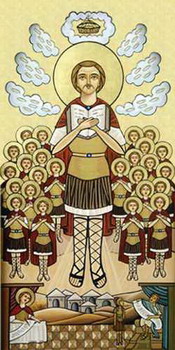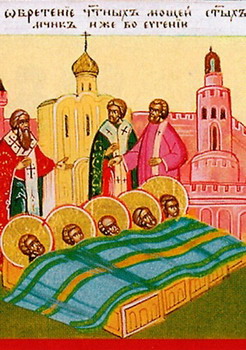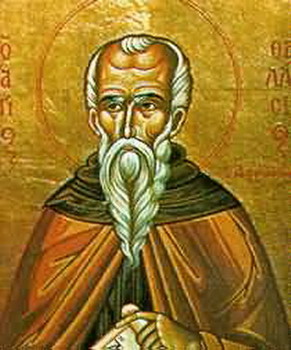|
|
The Holy Martyr Maurice and the 70 soldiers with him There was a great persecution of Christians in the time of the Emperor Maximian. Maurice was in charge of the local army in the town of Apamea in Syria, and pagans reported him to the Emperor as a Christian and a spreader of Christianity among the soldiers. The Emperor himself came and took him for questioning. Seventy soldiers were brought before the Emperor with Maurice, among them his son, Photinus. The Emperor was unable to make the heroes waver either with flattery or with threats. To them, they replied: "O Emperor, there in no fear in the wise and strong souls of those who love the Lord." When the Emperor ordered that their military belts and clothing be stripped from them, they said: "Our God will clothe us with raiment and girdles that are uncorrupting, and with eternal glory". When the Emperor rebuked them for holding in contempt the military status he had given them, they replied: "Thine honour is dishonourable, for thou hast forgotten God, who gave thee this royal power." Then the Emperor ordered that Maurice"s son be slain before his eyes, that he might thus intimidate the father and the others. But Maurice said: "Thou hast fulfilled our desire, O torturer, and sent Photinus the soldier of Christ, on before us." Then the Emperor sentenced them to a most inhuman death: he had them taken to a marshy place, stripped, bound to trees and smeared with honey, for the mosquitoes, wasps and hornets to eat. They gave their souls to God in terrible torment after ten days, and went to eternal rejoicing with the holy angels in heaven. Christians secretly took their bodies and buried them. These courageous soldiers of Christ suffered in about 305. There was a great persecution of Christians in the time of the Emperor Maximian. Maurice was in charge of the local army in the town of Apamea in Syria, and pagans reported him to the Emperor as a Christian and a spreader of Christianity among the soldiers. The Emperor himself came and took him for questioning. Seventy soldiers were brought before the Emperor with Maurice, among them his son, Photinus. The Emperor was unable to make the heroes waver either with flattery or with threats. To them, they replied: "O Emperor, there in no fear in the wise and strong souls of those who love the Lord." When the Emperor ordered that their military belts and clothing be stripped from them, they said: "Our God will clothe us with raiment and girdles that are uncorrupting, and with eternal glory". When the Emperor rebuked them for holding in contempt the military status he had given them, they replied: "Thine honour is dishonourable, for thou hast forgotten God, who gave thee this royal power." Then the Emperor ordered that Maurice"s son be slain before his eyes, that he might thus intimidate the father and the others. But Maurice said: "Thou hast fulfilled our desire, O torturer, and sent Photinus the soldier of Christ, on before us." Then the Emperor sentenced them to a most inhuman death: he had them taken to a marshy place, stripped, bound to trees and smeared with honey, for the mosquitoes, wasps and hornets to eat. They gave their souls to God in terrible torment after ten days, and went to eternal rejoicing with the holy angels in heaven. Christians secretly took their bodies and buried them. These courageous soldiers of Christ suffered in about 305.The Many Martyrs of Eugenius, near Constantinople In the time of the Emperor Arcadius, the relics of many Christian martyrs were excavated, among which were those of the Apostle Andronicus and his helper, Junia (Rom. 16:7). These relics were discovered by a revelation from God to a certain cleric, Nicolas Calligraphus. "God alone knows their names, and He has written them in the Book of Life in heaven." The Emperor Andronicus the First built a fine church over the relics of his namesake in the 12th century. In the time of the Emperor Arcadius, the relics of many Christian martyrs were excavated, among which were those of the Apostle Andronicus and his helper, Junia (Rom. 16:7). These relics were discovered by a revelation from God to a certain cleric, Nicolas Calligraphus. "God alone knows their names, and He has written them in the Book of Life in heaven." The Emperor Andronicus the First built a fine church over the relics of his namesake in the 12th century.Our Holy Fathers Thalassius and Limnaeus Syrian hermits, one of their especial ascetic practices was of silence. After the death of St Thalassius in 440, Limnaeus joined St Maron and lived with him on a mountain top beneath the open sky. Syrian hermits, one of their especial ascetic practices was of silence. After the death of St Thalassius in 440, Limnaeus joined St Maron and lived with him on a mountain top beneath the open sky.St Papius of HierapolisHe was a disciple of the holy apostles and a Patristic writer. From him we have testimony concerning the Gospels of Matthew and Mark, the four Maries and the Lord"s brothers, as well as one incomplete manuscript: "A Commentary on the Words of the Lord." He died in about 130.
|